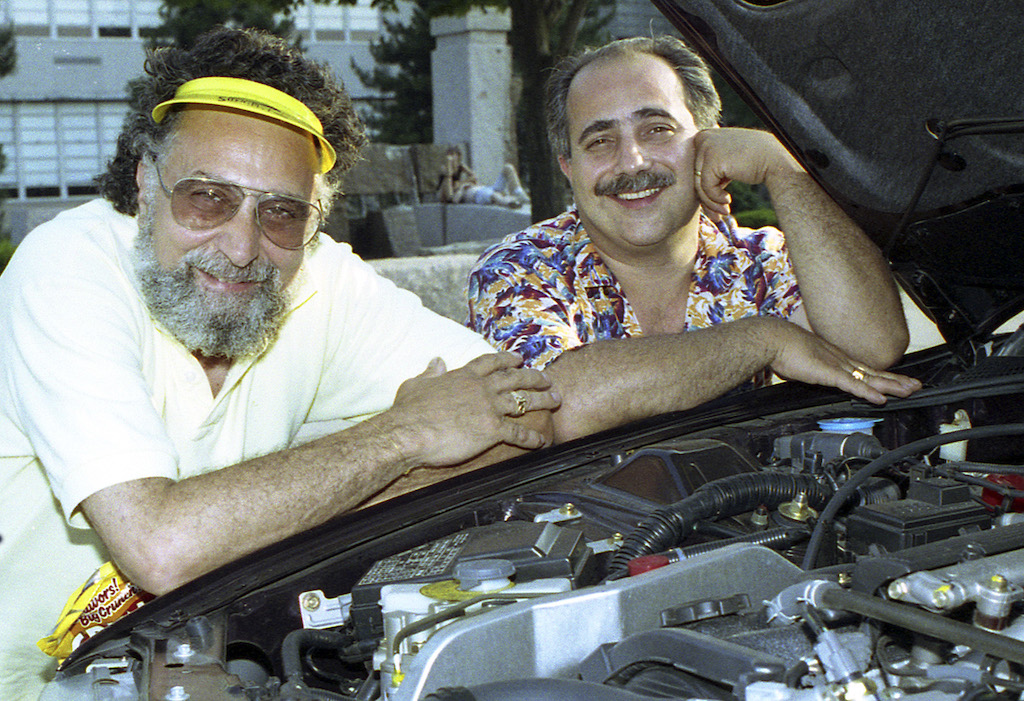‘Car Talk’ and Our Cultural Divides
The popular radio show helped break down barriers that keep us from knowing each other. It will be missed. "Car Talk" hosts Tom and Ray Magliozzi, also known as "Click and Clack, the Tappet Brothers," in 1991. (Susan Walsh / AP)
"Car Talk" hosts Tom and Ray Magliozzi, also known as "Click and Clack, the Tappet Brothers," in 1991. (Susan Walsh / AP)
The reruns of “Car Talk” have run their course. One of the two hosts died several years ago, and with the archiving of the radio show, we will lose a valuable cultural resource: a depiction of the rich thinking involved in common blue-collar work. This matters in a country so fractured by class and cultural divides, one of which involves beliefs about work and intelligence.
“Car Talk” was a popular decades-old show on National Public Radio featuring two Boston-area garage owners, Tom and Ray Magliozzi, who took calls about car repair, and, along with self-deprecating wisecracks and commentary on all things automotive, thought their way through the problems callers described. Tom and Ray asked questions; zeroed in on the details of sound, touch and smell; isolated variables; and eliminated less likely causes. Both brothers had science backgrounds from MIT but were down-to-earth; smart without being showy. They would occasionally draw on their knowledge of physics or chemistry, but most of what listeners got was the diagnostic reasoning displayed by generations of skilled auto mechanics and taught in good training programs.
The advice-giving show with call-ins is an old format in radio. There are shows on home repair, health, personal finance, cooking and relationships. Some of these shows involve the host reasoning through a problem. But the popularity and longevity of “Car Talk” is remarkable. The show was well-produced and comical, but the center of it was the Magliozzi brothers’ diagnostic skills. Except for “This Old House” and, to an extent, “Dirty Jobs,” I don’t know of another show with this reach that brought the intelligence involved in blue-collar work to an audience that included so many non-blue-collar listeners.
Why is this diversity of audience important?
For all our social advances, we still live with formidable barriers that keep us from knowing each other. Many areas of the country are resegregating by race. Growing economic disparity also leads to segregation by social class. The explosion of media outlets and new media platforms enables us to live in informational and ideological silos. One divide I’ve been writing about for a while involves work—the kind of work people do, the class-infused biases we have about the intellectual demands of different kinds of work, and the attributions about intelligence we make about each other based on the work we do.
In school, in business and industry, in our social networks and organizations, in popular culture, there are subtle and not-so-subtle messages about brainpower and the way people make a living. Consider, as one example, the widely made claim by writers on business and the economy that work in the “new economy” requires fundamentally different intellectual skills from work in traditional industries and services. “Whereas organizations operating in the Industrial Age required a contribution of employees’ hands alone,” write the authors of “Leveraging the New Human Capital,” “in the Information Age intellect and passion—mind and heart—are also essential.”
Some writers on the economy reduce this claim to an even simpler formulation, distinguishing between the “neck-up” work of the new economy versus the “neck-down” work that preceded it.
It is legitimate to claim that certain kinds of emerging jobs require specialized skills or that alternative organizational structures bring with them different ways to manage work. How revealing it is, though, that so many make these claims by erasing any intellectual content in the work of just a generation or two ago, work that still surrounds and sustains us. This erasure may well be done for rhetorical effect, but it also displays class bias and ignorance about the actual performance of traditional blue-collar work.
Enter Tom and Ray Magliozzi thinking out loud about a commonplace century-old technology. “Car Talk” was one radio show, a very small thing in our cultural landscape. But it represented a kind of cognitive border-crossing that is rare today. Work is laden with assumptions about virtue, intelligence and motivation, so it’s not a bad place to begin consideration of all that separates us.
“Car Talk” was free of charge, a public good available to us once a week that helped us to appreciate the occupational intelligence that sits on one side of our social class divide.
Your support matters…Independent journalism is under threat and overshadowed by heavily funded mainstream media.
You can help level the playing field. Become a member.
Your tax-deductible contribution keeps us digging beneath the headlines to give you thought-provoking, investigative reporting and analysis that unearths what's really happening- without compromise.
Give today to support our courageous, independent journalists.




You need to be a supporter to comment.
There are currently no responses to this article.
Be the first to respond.